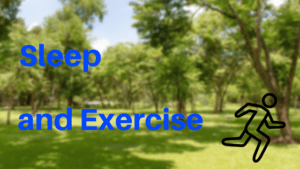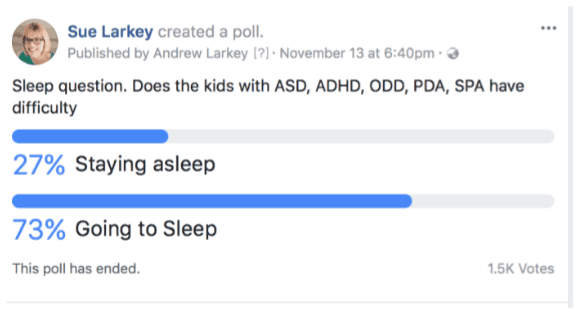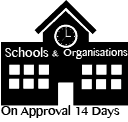
Research has found that both exercise and sleep can improve attention, mood, executive function, and self-regulation.
“Sleep disturbance impacts cognition, it impacts mood, and it impacts behavior.” Stanford University Psychologist Ruth O’Hara
Research has found that two thirds of children with ASD have sleep problems, fragmented sleep, and early awakenings. So be aware that many of our students can be fatigued by early afternoon and may benefit from easier, more repetitive learning tasks in the afternoon.
On my Facebook page I recently did a Poll which 1,540 people voted.

Remember different strategies work for different children, and if one strategy doesn’t work, try another.
16 Key Strategies for Sleep
- Set up a good bedtime routine. Use timers/clocks/sensory tools.
- Melatonin (Medication).
- Teach to stay in bed even if not sleeping.
- Epsom Salts, Bath or Lavender.
- Turn off all “blue screens” (iPads, TVs etc.) at least onehour before sleep.
- Keep bedroom door open.
- Accept lack of sleep can be related to anxiety levels sothey may need time to pace.
- Check for food allergies particularly gluten intolerance.
Subscribe below to see the other 8 strategies
Exercise
The benefits of exercise and overall fitness are well known for improving general health, mood, and stress management. Fitness is associated with better working memory, response inhibition, and learning in students.
For many families, daily exercise for children is a challenge, depending on climate, weather, cost, and neighborhood. Here are some solutions that families found:
- Playgrounds: Monkey Bars, Swings, Obstacle Courses.
- Trampoline.
- Swimming.
- Bike Riding, Scooter.
- Running, Walking.
Subscribe below to see the other 6 solutions
Excerpt page 126 The Ultimate Guide to School and Home
Top Selling Resource for School and Home
The Ultimate Guide to School and Home: By Sue Larkey and Anna Tullemans
This book provides key strategies for all ages and stages. It offers over 500 practical strategies and time savers for school and home. Everything from setting up a classroom, developing friendships, engaging disengaged students, to moving house, choosing a school and applying for a job. It is the ultimate guide for teachers, parents and all professionals supporting children with autism spectrum disorder, including Aspergers, ADD, ADHD, ODD and other developmental delays.
Click here to get a copy of The Ultimate Guide to School and Home


 Sorry we no longer ship items outside Australia. Please consider the digital versions of Sue’s Books –
Sorry we no longer ship items outside Australia. Please consider the digital versions of Sue’s Books – 